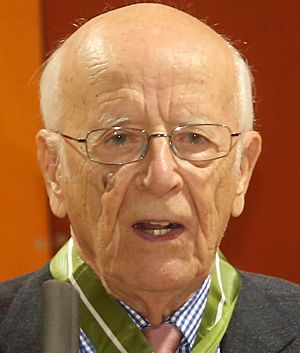Emilio Lledó facts for kids
Quick facts for kids
The Most Excellent
Emilio Lledó
|
|
|---|---|

Lledó in 2008
|
|
| Born |
Emilio Lledó Íñigo
5 November 1927 Seville, Spain
|
| Seat l of the Real Academia Española | |
| Assumed office 27 November 1994 |
|
| Preceded by | Joaquín Calvo Sotelo |
Emilio Lledó Íñigo is a Spanish philosopher born in Seville on November 5, 1927. He has taught philosophy at several universities and is a respected member of the Royal Spanish Academy, which is an important group that looks after the Spanish language.
Contents
Emilio Lledó's Journey in Philosophy
Emilio Lledó finished his high school studies at Instituto de Bachillerato Cervantes. In 1952, he earned his degree in philosophy from the Complutense University of Madrid. He then traveled to Germany to continue his studies in classical philosophy. There, he worked with a famous philosopher named Hans-Georg Gadamer. Gadamer helped him get a scholarship from the Alexander von Humboldt Foundation to finish his advanced degree, called a doctoral thesis.
In 1955, Lledó got a job at the Complutense University of Madrid. However, after he got married in 1958, he went back to Germany. This was because Gadamer, who was then a dean at the University of Heidelberg, offered him a teaching position there.
In 1962, Lledó returned to Spain and started working as an instructor in Valladolid. After two years, he became a full professor at the University of La Laguna. Soon after, in 1967, he moved to the University of Barcelona, where he was given a special teaching position in Philosophy. In 1978, he moved again to the National University of Distance Education (UNED). He stayed there until he retired.
Emilio Lledó was chosen to join the Real Academia Española on November 11, 1993. He officially took his seat there on November 27, 1994.
What Emilio Lledó Thinks About Philosophy
Emilio Lledó believes that the history of philosophy is like a "collective memory" for all of humanity. He thinks it shows how people have grown and developed over time. He says we can understand this history by looking at three main things:
- Ancient Greek Philosophy: He pays special attention to the ideas of Plato (found in his "dialogues" or conversations) and Aristotle (especially his ideas about how to live a good life, called "ethics"). He also looks at Epicureanism, which is a philosophy about finding happiness.
- The Importance of Language: Lledó believes that language is very important for understanding philosophy. He thinks that studying how we use words helps us understand deep philosophical ideas. This idea is also important in many European philosophies developed after World War II.
- Thinking About Time and Writing: He also explores ideas about time and how writing helps us remember things. This leads to what he calls a "philosophy of memory" and a way of understanding human culture through texts. This comes from a field called "hermeneutics," which is about interpreting texts.
Books by Emilio Lledó
- Filosofía y Lenguaje, Ariel (1970)
- La Memoria del Logos, Taurus (1984) ISBN: 84-306-1250-5
- Memoria de la Ética, Taurus (1994) ISBN: 84-306-0094-9
- El Silencio de la Escritura, Espasa (1998) ISBN: 84-239-7439-1
- El Surco del Tiempo: Meditaciones Sobre el Mito Platónico de la Escritura y la Memoria, Crítica (2000) ISBN: 84-8432-144-4
- Elogio de la infelicidad, Cuatro (2005) ISBN: 84-934176-0-2
- Ser Quien Eres: Ensayos para una Educación Democrática , University of Zaragoza (2009) ISBN: 84-92521-98-8
- Lenguaje e Historia, Dykinson (2011) ISBN: 84-998221-0-X
- El Epicureísmo, Taurus (2011) ISBN: 84-306-0869-9
- La Filosofía, Hoy, RBA (2012) ISBN: 84-90064-20-2
- Los Libros y la Libertad, RBA (2013) ISBN: 84-90065-68-3.
- Palabra y humanidad, KRK (2015).
- Pensar es conversar. Diálogo entre filósofos, with Manuel Cruz, RBA (2015).
- Fidelidad a Grecia, Cuatro (2015) ISBN: 9788493856663.
Awards and Recognitions
Emilio Lledó has received many honors for his work, including:
- Life member of the Institute for Advanced Study, Berlin (1988)
- Elected to the Royal Spanish Academy (1993)
- Menéndez Pelayo International Prize (2004)
- Order of Merit of the Federal Republic of Germany (2005)
- Lázaro Carreter Prize, from the Germán Sánchez Ruipérez Foundation (2007)
- Princess of Asturias Award (2015)
- A library in Salteras, his parents' hometown, has been named after him.
See also
 In Spanish: Emilio Lledó para niños
In Spanish: Emilio Lledó para niños
 | DeHart Hubbard |
 | Wilma Rudolph |
 | Jesse Owens |
 | Jackie Joyner-Kersee |
 | Major Taylor |

